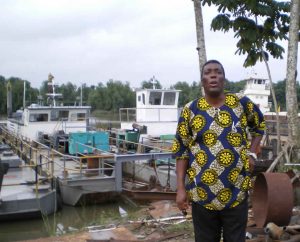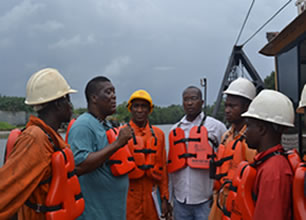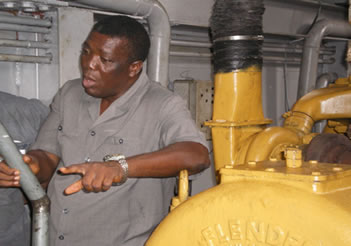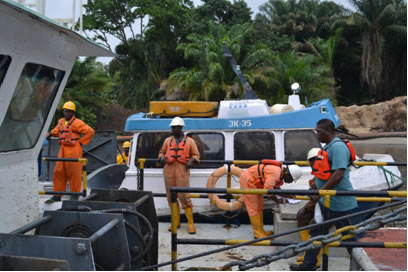3rdqtr08edition

A Special Focus on Jeph Kebbi International Dredging Activities…
Niger Delta Host Community Relations: Understanding FTO
The current news of flooding in the Niger Delta provided a backdrop for our recent meeting with Jeph Okoro, a Warri-based engineer, dredge builder and dredging contractor and the CEO of Jeph Kebbi International (JKI). With dredge spreads (project sites) scattered all over the Niger Delta, Jeph cannot afford to be reclusive. He is found at home in Port Harcourt, Bonny or Yenagoa just like in Warri, because, as he told the magazine, “someone will die if I don’t intervene”. His presence makes the difference between life and death in many communities hosting his projects. Or even in his native village where he is held in very high regards. The meaning of his bold assertion is both literal and philosophical.
As part of resettlement efforts for victims of the recent flood disasters, his company donated N6m to his village. Again, to prove his point, two phone calls came in just as our interview appointment at an Abuja hotel was just about to set off. One was from his village, Uzere in Isokoland. A chieftaincy dispute was getting out of hand, violence was being threatened. But Jeph was respected by all sides in the dispute because he was seen as neutral. Also, as a financial heavyweight, he can afford to be neutral and apolitical. He gave a directive and asked one of the contenders to see him at an appointed time, a measure that assuaged the situation and staved off a violent outcome.

The other call was from a project site, host-community relations problem. Many of the problems are money-sharing disputes, a recurring decimal in these parts. Jeph also disposed of the matter in dispute: a conversation in the local Isoko dialect ensued and peace overtures were proposed and adopted. Does this worry Jeph? Yes and no, though, mostly his answer is no. He explained that, nowadays, as a rule, he readily settles all community requests before mobilization to site because the local people had been jilted for such a long time that they had developed suspicion for all companies working in their communities. Plus, the problem of pervading rural poverty. So that, only actual delivery on agreements can move the villagers to collaboration. JKI has worked successfully recently at Otumara and Asaron communities by applying the mantra of carrying the communities along. Consequently, all over the Delta communities presently, JKI enjoys automatic FTO (freedom to operate), the final credential required by Shell before allowing any of its oilfield contractors to mobilize to site.
However, the financial stakes of these community settlements are high. According to recent media reports, Shell spent $383m in 2011, about 40% of its global security costs in Nigeria, to pay for police, army and private security guards services. In one mobilization to a dredging site last month, JKI spent over N40m on the communities. Jeph said sometimes the oil companies reimburse part of the security expenses and sometimes, they don’t, leaving his company to bear it as part of overhead costs. But he said the industry is experiencing a boom of sorts right now, with choice jobs available for JKI’s five big dredgers to tackle. His yard, which is guarded round-the-clock by soldiers, is crammed full with both serviceable and old equipment, including the tallest barge-mounted crane in the city capable of lifting 300 tons. Moreover, this yard with a long stretch of waterfront provides secure jetty services for own and third-party commercial clients as a layover for barges, dredgers, houseboats, tug boats and other watercrafts.
But Jeph’s larger than life profile is belied by his simple approach to the subject of wealth. He is too busy to consider the topic, even though his total worth will not be less than many millions of dollars. Rather he adopts the low-profile, ordinary presence: most times, he sports a casual shirt and trousers with sandals or simple native wears made from cotton prints, without head gear. What is his kick? He hates politics but finds ready excitement in extra business pursuits that promise further engineering titillation: he is surveying for a new venture right now that has to do with street lighting, on a large scale. Trained in the US and Europe in electrical electronics, Jeph made waves in Nigerian dredging circles with his penchant for re-configuring imported dredgers to perform above factory-installed capacity through re-programming. His dredgers are preferred by many of the IOCs because of their performance records.
Secondly, being an engineering guru, and doing his own repairs, downtime on his dredgers is almost zero. In this exclusive interview, Jeph explains the host-community issues, the relations with client oil companies, the effect of the local content law on the IOCs, and proffers solutions for social peace, improved security of life and properties in the Niger Delta. Excerpts:
DDH: How many barges do you have now?
Jeph: Four. We are in Port Harcourt working there now, Bonny.
DDH: What kind of project is that?
Jeph: Dredging. A Shell job.
DDH: Are Shell jobs still good?
Jeph: Yes. We have a running contract for almost five years now. We work East and West divisions for Shell in the Niger Delta.
DDH: Now, do you think that because the white people were chased away, that’s why you and other Nigerians are getting the jobs?
Jeph: No. We have developed to the standard Shell requires. And coupled with the local content law. Shell now has grasped the need to comply with the local content law because they want to comply with what Nigeria requires. The local content contractor tends to be cheaper for them to run than the multinational companies. Because [for] the multinational companies, their overhead costs is high, their bids are high. We [Nigerian companies] use local Nigerians, we don’t have expatriates we pay one point something million Naira every month.

DDH: So, actually it’s a cheaper deal for them, they are not doing you guys a favour?
Jeph: No. it’s a cheaper deal, they like it. The conditions [of the local content law] are even easier for them. [Two phone calls later…] Oh, I pick my phones, if not somebody will die.
DDH: …Somebody will die?
Jeph: Yes, somebody will die. [Let’s] Suppose they hold some people hostage. They do not want me, it’s my money they want. So, you need to pacify them.
DDH: So you get many calls?
Jeph: Ah, I receive various calls. The two calls I received just now, one was from my community asking me …. So far the role that I have played in my community. Am not part of any of the sides. But truly they have a lot of honour for me in my community. Am highly respected.
DDH: But what is the dispute about?
Jeph: Power.
DDH: Are they calling on you because you are financial heavyweight?
Jeph: A neutral person and a heavyweight. So, everyone wants to run to me. You see, there is flooding in my hometown which wiped everything off, everybody, every house. Including my house, the water is chest high. And that means there is no more food in the community. I have made a budget of about N6m so far to bring food from the north, south, etc. So, by the second week of October, the flood must have gone down and we start distributing all the food. So, I have given the matter to somebody to handle and they are calling me to thank me.
DDH: Does the flood happen often?
Jeph: Floods come every year but not up to this level. It has not happened for the last forty or fifty years.
DDH: Which community is your own?
Jeph: Isoko, Uzerre community.
DDH: You said the other phone call was from your project site deep in the delta, what happened there?
Jeph: Operational issues but they have been solved. When they hear my voice, they calm down. I will say for this trouble here, let me talk to so-so person, see me at so-so time.
DDH: Are these community issues too?
Jeph: Yes, we have more of community issues than any other thing. The community boys are restive.
DDH: Is the whole problem a question of money?
Jeph: Yes, they are not looking for any other thing. To be honest with you, the oil sector has never had it so good. They were doing divide-and-rule before. Now, they have made some people higher than others and others very poor. It’s not easy to bridge this gap. Now, these poor ones always want to do their own so that you have to pay them some money if you want to work in their territory. Whether they come to work or not, you pay them that money.
DDH: Does this mean you have to engage them as your workers?
Jeph: They are not working for you. They sit around and you pay them that money. They will give you a levy to pay, all these to extort money.
DDH: But you as an indigene of Niger Delta, do you not have a leverage based on that?
Jeph: I, for one, would prefer that you teach someone how to fish but don’t give him fish. Let me tell you why Niger Delta problem is calming down. Those [commanding the boys] have touched money, they don’t want to die again. Even the smaller ones that have got some millions, tell them to carry it and fight, they don’t want to die again. But when they haven’t got it they want to die to get it.
DDH: Then what about the federal government amnesty programme, what are its chances of success?
Jeph: What could have helped this country, have a percentage [of oil revenue] for the villages. Wherever oil is discovered, this is the percentage that goes to them. It’s either you use it to establish some business, do something for them in that village. With time, this problem [militancy] will go away.
DDH: But what about the 13% derivation principle which gives oil-producing states so much money higher than others?
Jeph: That one goes to the states which they share their own way, not according to the wishes of the people.
DDH: Is this responsible for the community anger against dredging operators?
Jeph: You have to pay through your nose. Don’t you see how much Shell is paying for security? Where does the money go to? You see, before they were paying to the senior boys. Now, the junior boys say that the senior boys cannot eat alone. So, Shell is looking down to cater for them as well.
DDH: As a dredge contractor, the community boys also come down on you? During your last mobilization, you said you had paid more than N40m for community settlements and it was not sufficient for them?

Jeph: For them, I had not even started. (General laughter). Now to start, I will pay again. After one month, I pay again.
DDH: Is it a monthly payment?
Jeph: Yes. So, I can’t cope. I need to sustain my operations, for my workers to get salary.
DDH: Do you get the chance to pass the bills to the client?
Jeph: No. They have awarded you a contract, signed. On exceptional cases, they may accept your [security] bill. But you have to pay a part of the bill too. Chevron is doing well; Chevron takes care of all those responsibilities. When Chevron has a community problem, they will settle with them. You contractors go and work. But not Shell. In some cases, they help you but…
DDH: The last time we interviewed you, you were building dredgers. Are you still building dredgers or do you prefer to buy ready-made ones?
Jeph: I am not building now, I buy. But I have enough dredgers now.
DDH: How many do you have now?
Jeph: Five big ones. I have two grab dredgers, one very big. I built the barge here and got the other parts…
DDH: How do your workers cope with them?
Jeph: I train them in different skills, welding, etc.
DDH: Do you train your dredge masters?
Jeph: We have not been training dredge masters, we only give them orientation, those we ask and they say they are qualified. But we are now having our own dredge masters, those trained by us [on board JKI dredgers]. They perform even better. We train other skilled hands than dredge masters, like the crane operators, riggers, even the officers at the office, you train them.
DDH: How many workers do you have?
Jeph: About 151. We have two dredge spreads. My average salary per month for my permanent staff is about N8m. Like in Bonny, I have 36 workers in the field.
DDH: Are these casual workers?
Jeph: Yes, they impose them on you.
DDH: But are they really working for you?
Jeph: It doesn’t matter, you have to bring them in otherwise they cause trouble.
DDH: So, you put down their names and keep paying them?
Jeph: No, they tell you what to pay. If you want to be in peace, you pay.
DDH: So with this you are assured of security for your workers and for your equipment?
Jeph: No, after that there’s what you call JTF [Joint Task Force, official security operatives]. You bring a house boat for them, put them there and pay as well and feed them. At least they allocated 20 for me with a houseboat, you pay. But Shell will give you rebate, some part of it. For example, if you have 20, Shell will pay for 14 and you take care of 6.
DDH: This sounds like a war front…?
Jeph: But somehow, in the Delta here, we are just known everywhere. Once they hear the name Jeph Kebbi nobody wants to come near. They allow us to go. In fact, Shell now reserves the work for us. They will say, where is the FTO, give it to Jeph Kebbi.
DDH: What is FTO?
Jeph: Freedom to operate, the paper you sign with the community after meeting with them and concluding terms of agreement. Without you signing this with the community, Shell will not allow you to go to site. At the meeting, you tell them what you are to do for them, number of workers, etc.
DDH: You do this in each site?
Jeph: Yes.
DDH: It would appear that nobody else but indigenes of the Niger Delta can operate in these areas?
Jeph: No, you can operate but you pay more.
DDH: Do you know any other operator that is not from the Niger Delta?
Jeph: Yes, there is one other contractor there though he is not efficient. He is from the east but his problem is not from the community. You see you have to know your job, plan your job well and have the backup money to do it. If you play game with the community, the community will mark you. And you will always be at loggerheads with them and end up paying more. (General laughter). For us to succeed… me, sometimes, I will take a speed boat, cook rice [and send to the villagers]. There was a day I took my two children, cooked rice, and pulled to the village. The villagers came out and announced that the managing director came and cooked rice… Everybody gathered and ate. From then onwards, [no more problems]. That was the most difficult community, in Delta, Jones Creek area. Shell now gives me all the jobs in Jones Creek because when we go to their community, no problem. We will tell the community what I don’t want to do and what I will do, so they know that this man doesn’t promise and fail. They are so happy when they see people who are trustworthy. The community to be honest, are greedy, but most of the trouble arose because of distrust. They promised them and did not deliver; that made them to go wild. Now, they get it before you start work.
DDH: How is the sand mining business in Warri?
Jeph: It’s progressing.
DDH: Do you do pump and sell?
Jeph: No, because of the criminality involved, I stay off it.
DDH: For people who want to buy dredgers now, do you advise them to build locally or buy from overseas?
Jeph: Those who want dredgers don’t know what kind of dredgers they want. They want a dredger that can do everything. No. So, you first ask yourself what area of dredging you are going into. If you are mining sand, pump and sell, just build a dredger for that sort of thing. But you want your dredger to do four different jobs. No. They don’t know what they want, they look at the money. What is the reason we have five dredgers? Because of different applications. Some contracts are bigger and some are smaller, for shorter ladder and longer ladder. If you have a dredger with long ladder and you send it to a shallow river, what is the use? You are not performing well.
DDH: How can Nigerian young dredging companies be encouraged to grow bigger?
Jeph: It’s the forum, the dredging association, that’s the only way out. If not, forget it.
DDH: To rally round everybody?
Jeph: Yes, key-in towards channeling everybody’s energy, get bigger. That’s the only way out.
DDH: NIMASA during the last dredging summit in Abuja was announcing their 2% levy on dredging contracts. What is your view on that?
Jeph: That will not work. I know we have 1%, is it for NIMASA? Whether it’s for NIMASA I don’t know. And I know that will apply from 2013.
DDH: Are you are talking about 1% of profit…?
Jeph: Yes, to be deducted from source by the oil companies. So, when you are bidding for the job, you bid with that inclusive. This is part of the local content law implementation, not for every job you do for them but to be applied for most of the turn-key projects.
DDH: The last time we interviewed you, you spoke of developing a modern electronic engineering workshop in Warri. Are you still going to do it?
Jeph: Am still on it. It will take $30m.
DDH: Can you pull it off? Alone or with partners?
Jeph: I prefer partnership. Any partner but not government.
